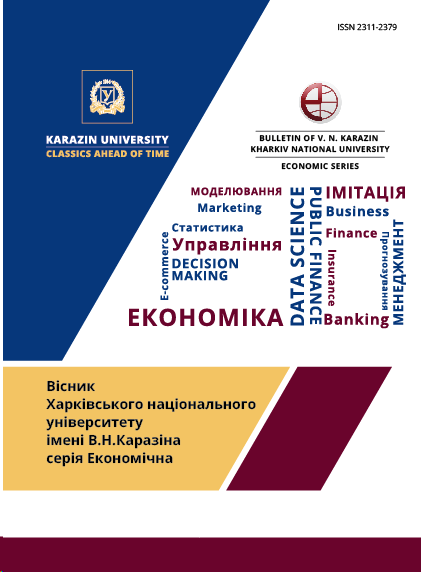The relevance of the transition to a circular economy for Ukraine
Abstract
The article deals with the problem of solid waste accumulation in the world and in Ukraine. The volumes of municipal solid waste and its distribution in different regions of the world are analyzed. The importance of efficient waste collection as a key aspect of waste management is emphasized, as well as the need for immediate measures to prevent further deterioration of the environmental situation. The article presents an analysis of the pre-war situation with waste management in Ukraine in terms of such indicators as the dynamics of waste generation and the share of its recycling, the number of operating business entities of various sizes in the field of waste processing. In addition, the article highlights the impact of military events on the environmental situation in the country and emphasizes the need for changes to build a sustainable economy, which may be possible through post-war recovery. In the context of finding solutions to reduce the negative impact of waste on the environment, the authors consider the concept of circular economy, which involves production aimed at reusing resources and reducing the volume of waste generation in order to ensure sustainable development. The basic principles of the circular economy and the hierarchy of waste management that has been formed in the EU are presented. In addition, the article presents the main program documents in Ukraine aimed at developing the circular economy, such as national strategies, plans and concepts. The article also examines the obstacles to the successful implementation of circular economy principles in Ukraine, such as imperfect regulatory framework, insufficient funding for environmental protection and waste management, and the lack of an integrated approach at various levels of the economy. Based on the analysis, the authors conclude that it is necessary to intensify efforts to implement the principles of the circular economy at Ukrainian enterprises. The authors emphasize the need to create incentives for innovation and investment in modern technologies to reduce the harmful effects of waste on the environment.
Downloads
References
Jiao, W., Boons, F. (2014). Toward a research agenda for policy intervention and facilitation to enhance industrial symbiosis based on a comprehensive literature review. Journal of Cleaner Production, 67, 14-25. doi: http://dx.doi.org/10.1016/j.jclepro.2013.12.050
Korhonen, J., Nuur, C., Feldmann, A. (2018). Circular economy as an essentially contested concept. Journal of Cleaner Production, 175, 117-125. doi: https://doi.org/10.1016/j.jclepro.2017.12.111
Zalunin, M.M. (2019). Circular economy as a prerequisite for sustainable development. Black Sea Economic Studies, 47-1, 196-201. doi: https://doi.org/10.32843/bses.47-69 (in Ukrainian)
Zlotnik, M.L., Melnyk, O.G. (2020). Strategic management of the implementation of circular economy principles at domestic enterprises. Entrepreneurship and Innovation, 12, 112-119. doi: https://doi.org/10.37320/2415-3583/12.19 (in Ukrainian)
Trushkina, N.V. (2021). Circular economy: formation of the concept, evolution of development, barriers, problems and prospects. Bulletin of Economic Science of Ukraine, 1 (40), 9-20. DOI: https://doi.org/10.37405/1729-7206.2021.1(40).9-20 (in Ukrainian)
Ruda, M.V., Yaremchuk, T.S., Bortnikova, M.G. (2021). Circular economy in Ukraine: adaptation of European experience. Management and entrepreneurship in Ukraine: stages of formation and problems of development, 3, 1. (in Ukrainian)
World Bank. Trends in Solid Waste Management. Retrieved from https://datatopics.worldbank.org/what-a-waste/trends_in_solid_waste_management.html
World Bank. What a Waste Global Database. Retrieved from https://datacatalog.worldbank.org/search/dataset/0039597/What-a-Waste-Global-Database
Official website of Ecola. (2024). Retrieved from https://www.ecolaglobal.com/
Official website of the State Statistics Service of Ukraine. (2024). Retrieved from https://www.ukrstat.gov.ua/
Gorbal, N.I., Lomaga, Y.R. (2022). Circular economy as a basis for sustainable development of enterprises. Bulletin of Lviv Polytechnic National University. Series “Problems of Economics and Management, 1, 9. (in Ukrainian)
The only web portal of the executive branch of Ukraine. (2023). Total damage to the environment of Ukraine from the war. Retrieved from https://www.kmu.gov.ua/news/zahalni-zbytky-dovkilliu-ukrainy-sohodni-skladaiut-556-mlrd-ievro-denys-shmyhal (in Ukrainian)
Sauve, S., Bernard, S., Sloan, P. (2016). Environmental sciences, sustainable development and circular economy: alternative concepts for transdisciplinary research. Environment, 11, 48-56. doi: https://doi.org/10.1016/j.envdev.2015.09.002
European Parliament. (2023). Circular economy: definition, importance and benefits. Retrieved from https://www.europarl.europa.eu/topics/en/article/20151201STO05603/circular-economy-definition-importance-and-benefits#:~:text=The%20circular%20economy%20is%20a,reducing%20waste%20to%20a%20minimum
Haney, A., Krestyaninova, O., Love, Ch. (2019). The Circular Economy Boundaries and Bridges. Oxford: Said Business School, University of Oxford. Retrieved from https://www.sbs.ox.ac.uk/sites/default/files/2019-09/the-circular-economy.pdf
Deloitte. Kirchherr, J., Hekkert, M., Bour, R., Huibrechtse-Truijens, A., Kostense-Smit, E., Muller, J. (2017). Breaking the Barriers to the Circular Economy. Retrieved from https://circulareconomy.europa.eu/platform/sites/default/files/171106_white_paper_breaking_the_barriers_to_the_circular_economy_white_paper_vweb-14021.pdf
Morseletto, P. (2020). Targets for a circular economy. Resources, conservation and recycling, 153, 104553. Retrieved from https://www.sciencedirect.com/science/article/pii/S0921344919304598
Nogueira, L.A. (2023). Exploring the industrial dynamics of waste management and recycling: A call for research and a proposed agenda. Waste Management, 170, 33-39. doi: https://doi.org/10.1016/j.wasman.2023.07.022
European Commission. (2020). Communication from the Commission to the European Parliament, the Council, the European Economic and Social Committee and the Committee of the Regions: A new Circular Economy Action Plan For a cleaner and more competitive Europe. Retrieved from https://bit.ly/3rnvl0s
Dixigroup. (2020). The new EU policy on the "circular" economy: opportunities for Ukraine. Retrieved from https://dixigroup.org/wp-content/uploads/2020/09/dixi_pb_circular-economy_ukr_full_3.pdf (in Ukrainian)
Copyright (c) 2024 Voitko S., Vyshnevska A.

This work is licensed under a Creative Commons Attribution 4.0 International License.

